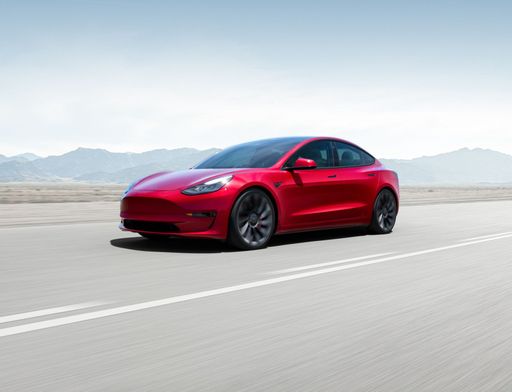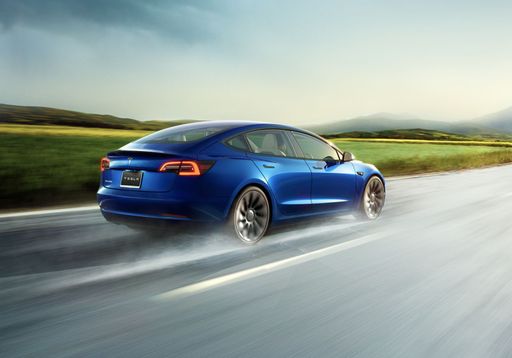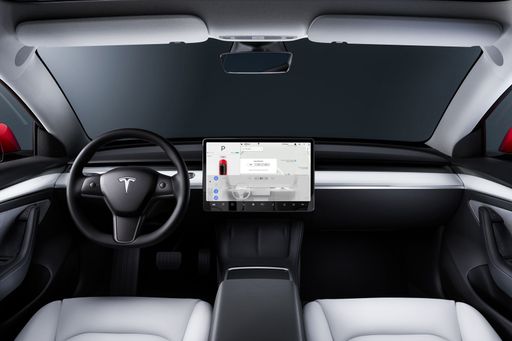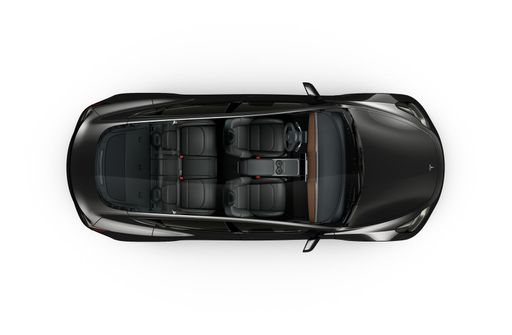VW Tiguan vs Tesla Model 3 - Differences and prices compared
Compare performance (272 HP vs 460 HP), boot space and price (33300 £ vs 34300 £ ) at a glance. Find out which car is the better choice for you – VW Tiguan or Tesla Model 3?
Costs and Efficiency:
When it comes to price and running costs, the biggest differences usually appear. This is often where you see which car fits your budget better in the long run.
VW Tiguan has a slight advantage in terms of price – it starts at 33300 £ , while the Tesla Model 3 costs 34300 £ . That’s a price difference of around 977 £.
As for electric range, the Tesla Model 3 performs decisively better – achieving up to 750 km, about 624 km more than the VW Tiguan.
Engine and Performance:
Power, torque and acceleration are the classic benchmarks for car enthusiasts – and here, some clear differences start to show.
When it comes to engine power, the Tesla Model 3 has a clearly edge – offering 460 HP compared to 272 HP. That’s roughly 188 HP more horsepower.
In acceleration from 0 to 100 km/h, the Tesla Model 3 is convincingly quicker – completing the sprint in 3.10 s, while the VW Tiguan takes 5.90 s. That’s about 2.80 s faster.
In terms of top speed, the Tesla Model 3 performs slight better – reaching 262 km/h, while the VW Tiguan tops out at 242 km/h. The difference is around 20 km/h.
There’s also a difference in torque: Tesla Model 3 pulls distinct stronger with 660 Nm compared to 400 Nm. That’s about 260 Nm difference.
Space and Everyday Use:
Cabin size, boot volume and payload all play a role in everyday practicality. Here, comfort and flexibility make the difference.
Both vehicles offer seating for 5 people.
In curb weight, VW Tiguan is a bit lighter – 1599 kg compared to 1822 kg. The difference is around 223 kg.
In terms of boot space, the VW Tiguan offers hardly perceptible more room – 652 L compared to 594 L. That’s a difference of about 58 L.
When it comes to payload, VW Tiguan noticeable takes the win – 533 kg compared to 333 kg. That’s a difference of about 200 kg.
Who wins the race?
The Tesla Model 3 proves to be dominates this comparison and therefore becomes our DriveDuel Champion!
Tesla Model 3 is the better all-rounder in this comparison.

Tesla Model 3
Costs and Consumption
View detailed analysis
Engine and Performance
View detailed analysis
Dimensions and Body
View detailed analysis
VW Tiguan
The VW Tiguan blends sensible family practicality with a dash of German polish, delivering a calm, reassuring ride and a cabin that never feels like an afterthought. For buyers who want an SUV that’s easy to live with yet still nicely dressed, the Tiguan is the grown‑up choice that keeps a cheeky wink in reserve.
details





Tesla Model 3
The Tesla Model 3 slices through daily commuting with a silent, confident shove that makes petrolheads reassess their life choices, while its minimalist cabin feels more like a slick gadget gallery than a traditional car interior. For buyers after a fuss-free, tech-forward electric with plenty of grin factor and low running drama, it’s hard to beat—just don't be surprised when the car updates itself overnight.
details



Costs and Consumption |
|
|---|---|
|
Price
33300 - 51900 £
|
Price
34300 - 50100 £
|
|
Consumption L/100km
1.4 - 8.4 L
|
Consumption L/100km
-
|
|
Consumption kWh/100km
-
|
Consumption kWh/100km
13.2 - 16.7 kWh
|
|
Electric Range
118 - 126 km
|
Electric Range
550 - 750 km
|
|
Battery Capacity
19.70 kWh
|
Battery Capacity
64.5 - 83 kWh
|
|
co2
32 - 190 g/km
|
co2
0 g/km
|
|
Fuel tank capacity
45 - 58 L
|
Fuel tank capacity
-
|
Dimensions and Body |
|
|---|---|
|
Body Type
SUV
|
Body Type
Sedan
|
|
Seats
5
|
Seats
5
|
|
Doors
5
|
Doors
4
|
|
Curb weight
1599 - 1890 kg
|
Curb weight
1822 - 1929 kg
|
|
Trunk capacity
490 - 652 L
|
Trunk capacity
594 L
|
|
Length
4539 mm
|
Length
4720 - 4724 mm
|
|
Width
1842 - 1859 mm
|
Width
1850 mm
|
|
Height
1656 - 1658 mm
|
Height
1431 - 1440 mm
|
|
Max trunk capacity
1486 - 1650 L
|
Max trunk capacity
-
|
|
Payload
460 - 533 kg
|
Payload
303 - 333 kg
|
Engine and Performance |
|
|---|---|
|
Engine Type
Petrol, Petrol MHEV, Diesel, Plugin Hybrid
|
Engine Type
Electric
|
|
Transmission
Automatic
|
Transmission
Automatic
|
|
Transmission Detail
Dual-Clutch Automatic
|
Transmission Detail
Reduction Gearbox
|
|
Drive Type
All-Wheel Drive, Front-Wheel Drive
|
Drive Type
Rear-Wheel Drive, All-Wheel Drive
|
|
Power HP
130 - 272 HP
|
Power HP
283 - 460 HP
|
|
Acceleration 0-100km/h
5.9 - 10.6 s
|
Acceleration 0-100km/h
3.1 - 6.1 s
|
|
Max Speed
210 - 242 km/h
|
Max Speed
201 - 262 km/h
|
|
Torque
220 - 400 Nm
|
Torque
420 - 660 Nm
|
|
Number of Cylinders
4
|
Number of Cylinders
-
|
|
Power kW
96 - 200 kW
|
Power kW
208 - 338 kW
|
|
Engine capacity
1498 - 1984 cm3
|
Engine capacity
-
|
General |
|
|---|---|
|
Model Year
2024 - 2025
|
Model Year
2025
|
|
CO2 Efficiency Class
G, D, E, F, B
|
CO2 Efficiency Class
A
|
|
Brand
VW
|
Brand
Tesla
|
What drivetrain options does the VW Tiguan have?
The VW Tiguan is offered with All-Wheel Drive or Front-Wheel Drive.




